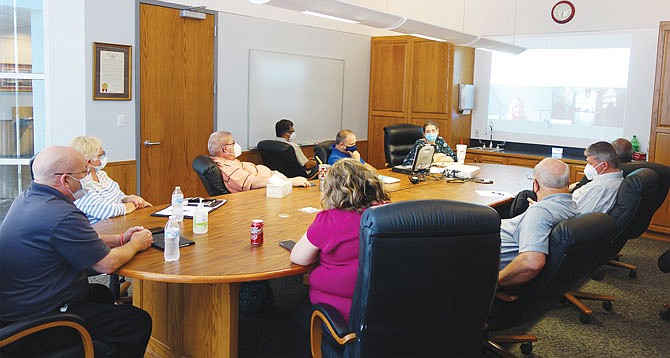This article is being offered free to all readers because it includes information that is important to the health and safety of our community.
Following a conversation Wednesday with top Missouri health official Dr. Randall Williams, Fulton city administrators are looking to adapt a mask ordinance passed in Springfield for Fulton.
No draft ordinance has been finalized, nor have city council members yet voted on an ordinance.
Williams is the head of Missouri's Department of Health and Senior Services, and he spent a half hour Wednesday speaking to Fulton administrators; city council members Jeff Stone (Ward 2), Mary Rehklau (Ward 2), Ballard Simmons (Ward 1) and Bob Washington (Ward 4); County Commissioner Roger Fischer and Callaway County Health Department director Sharon Lynch about the importance of masking.
"If you can't social distance, you need to wear a mask," Williams repeated, over and over.
That recommendation aligns with the U.S. Centers for Disease Control and Prevention and Dr. Deborah Birx, the White House coronavirus response coordinator who visited Missouri on Tuesday to deliver a similar message.
Story continues below video.
Williams said that with a health crisis this novel, there's not yet conclusive data that mask ordinances prevent the disease's spread.
"Of the 34 states that have passed mask ordinances, 23 have had more cases per 100,000 residents than Missouri," he said. "There's so many confounding factors, it's hard to make a dramatic statement."
But, he said, anecdotal evidence suggests masking does at least reduce the chance of the disease spreading from someone who has it to someone who doesn't. He pointed to a well-documented situation in Springfield in which two hair stylists became infected with COVID-19 and interacted with 139 clients and six coworkers before being diagnosed. The stylists spent at least 15 minutes in close quarters with each client.
But not a single client became infected - likely because the stylists and customers all wore masks.
Williams and Gov. Mike Parson have resisted issuing an ordinance making mask-wearing mandatory for the state.
"As the governor always says Missouri is a diverse state," Williams said. "A one-size-fits-all strategy doesn't fit Missouri. Almost 50 percent of Missouri's cases are in just three counties."
Mayor Lowe Cannell asked Williams whether now seemed to be the right time for Fulton to implement a mask ordinance.
"For me to weigh in on Fulton versus Sedalia versus Albany, we just feel very strongly that you have to work with your local health department, look at your data, look at your community, and make those decisions - which we certainly support," Williams said. "I don't think it's appropriate for me to weigh in on that because you know better than I do what your local situation is."
Then he repeated his earlier advice: "If you can't social distance, you need to wear a mask no matter where you are in Missouri."
As Stone pointed out later in the meeting, Fulton has tried politely asking people to wear masks.
"And we've seen our numbers rise," he said. "The point is to decide if that number is rising enough (to necessitate an ordinance)."
Fulton city officials have been discussing the possibility of a mask ordinance for weeks following a contentious public forum on the topic. The issue took on new urgency after a rapid increase in reported cases: The CCHD reported a 24-case increase between Monday and Tuesday, increasing Callaway County's known cases to 199 since the pandemic began (70 of which were active). By Wednesday afternoon, the DHSS was reporting 212 cumulative cases in the county (though the CCHD only showed 202).
It's unclear how many of those cases are in Fulton - which has become an ongoing point of contention between Fulton and the Callaway County Health Department.
"Right now, we don't know how many people in Fulton are affected," Simmons said. "We need good, solid data to see if we need a mask ordinance."
Lynch has maintained that providing city-level data would violate health privacy law HIPAA.
Williams offered to provide that data directly to the Fulton administrators.
"That level of specificity, I don't believe would be hampered by HIPAA," he said. "We can get that to you. We already do it for St. Louis."
Following the meeting, Fulton Mayor Lowe Cannell said he hopes the city can access that data on an ongoing basis.
After bidding farewell to Williams, those present discussed what form a Fulton mask ordinance could take. Fulton officials have been eyeing ordinances passed in Columbia, Springfield and St. Louis as potential models.
"Reading through the Springfield version, it goes into a lot of detail," Cannell said. "It seems overwhelming, but it also gives guidance. ... there's probably a lot of businesses that want to be told what to do and what not to do."
Enforcement remains an issue, however - during previous meetings, Lynch and Fulton Police Chief Steve Myers said they lack the resources to enforce a mask ordinance. That's a problem that can be solved, Cannell and Stone pointed out. The city could direct Myers to put an officer on mask enforcement and could help sponsor additional resources at the CCHD to investigate complaints.
"If you tell Chief Myers he has to enforce the law, he has to enforce the law," Stone said.
Though no formal vote was taken, council members verbally agreed the Springfield ordinance seems to provide a good model; city administration will work on adapting that ordinance, with further discussion likely to follow at next Tuesday's Fulton City Council meeting.
This article was edited at 3:45 p.m. Aug. 21, 2020, to clarify Williams' comment about the effectiveness of mask ordinances.

